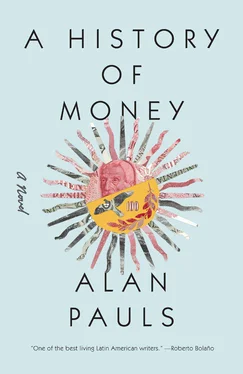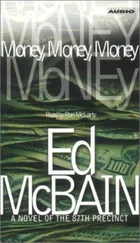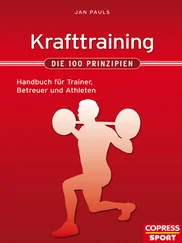In fact, this is also the first time he ever sees her shaking. She’s looking for her keys in her purse, and the moment she finds them she drops them and then stands motionless for a fraction of a second, bewildered, with the guilty hand frozen and shaking very slightly in midair, as though electrified by a cluster of simultaneous shocks. Every journey toward a glass of wine becomes unsteady and precipitous; writing a check ceases to be the child’s play it once was. She can no longer answer the phone without making the receiver dance in its cradle, so she begins to turn around and hide her shaking hand behind her own body, as though protecting it from mocking eyes. One afternoon, under pressure from the super, who’s been there for hours fixing the living room blinds and is now hanging about by the door, pretending to examine a loose lock in order to give her time to find a tip, she comes to him to ask for the usual quota of small change, and when she takes it — three small notes, folded in two, with a little stack of coins on top — the trembling cup her hands have formed gives a little, as though it might cave in from the weight.
No, he won’t be getting rich from his mother’s accidental death, or her husband’s. Not in that ignoble way — which much later, when he remembers those two months in 1975 and relives the excitement that flooded him every time the phone rang and he discovered that his mother and her husband were setting out on another flight, or getting back into the Giulia to go from one little town on the Côte d’Azur to the next, fills him with incomparable shame — nor any other, since he will always be useless not so much at earning money — because he will earn it, and sometimes in considerable sums, although always completely hopelessly, only realizing how considerable they are once he’s made them vanish, disappear into thin air, squandered them, not a fucking cent in the coffers, zero — as multiplying it or just keeping it as it is, intact, safe from any eventuality, beyond history, like an egg in a gene bank, a trophy in a club’s display cabinet, or a work of art in a museum. He would give everything he doesn’t and won’t ever have to know how to make money. Literally make it, produce it, like employees of the mint, or former employees who — later or even while still working there — become counterfeiters; or make it appear, like his father does, in fact, two Fridays of every month for years, between eleven at night and seven thirty the next morning, when he has a table booked —the turn of phrase he himself uses for his poker nights once they’ve been made common knowledge within the family — and also on his visits to the casino in Mar del Plata, lightning-fast excursions that also always begin on a Friday (one of the two left after those when he has a table booked), real raids of frenzied, compulsive gambling that start when he sets out, always in a taxi, on the 404 kilometers from the office at Maipú and Córdoba, right in the center of Buenos Aires, to 2100 Boulevard Marítimo Patricio Peralta Ramos, where he spends on average seven hours gambling ceaselessly — never playing roulette, which is for amateurs; it’s always baccarat or blackjack, sometimes baccarat and blackjack at the same time; seven hours without eating or sleeping and sometimes without even standing up to stretch his legs, fueled by whiskey and cigarettes, while the taxi driver — the same boy from Tucumán his ex-father-in-law hired to follow him, who lent him the six hundred pesos that helped him turn around that famous bad table — waits for him a few blocks away with the radio on, head nodding sleepily in a car parked by the square.
As for him, if there’s one thing he knows how to do with money, it’s pay. That’s the only thing he can boast about, pathetic as it is. He accepts this as the role assigned to him in an arbitrary but indisputable allocation. His lot is not to make money, like his father does, or to inherit it, like his mother. Of all the possible missions, his is to settle the books, be the one who clears accounts. Some people feed the hungry, others cure the sick. His way of healing wounds — a passion that’s not always very well understood — is paying. He assumes the role with the same resigned conviction with which he states his star sign — the one that gets by far the worst press in the whole zodiac — whenever he’s asked (generally by women, women he doesn’t want and who want him more than any he might ever want); but even so he performs it with an inexplicable satisfaction, in a state of euphoria, feeling like he does when, after exhausting his oxygen reserves with a lengthy exploration of the tiled bottom of a swimming pool, he pushes his head out of the water and uses the last of his energy to open his mouth wide and fill himself with lungfuls of air. There’s always a strange urgency in paying, no matter whether he’s on time or not: a suspense that seems to contradict the rather submissive nature of the act. While his friends steal money from the coats their parents leave hanging on the rack or siphon it from their monthly allowance to buy records, beer, clothes, cigarettes, and maybe a few hour-long sessions at seedy hotels, he, when he gets his first bit of money, the money he earns from his first job — which is to translate an article on the epicurean eccentricities of an English playwright who twenty years later, after he’s been ravaged by stomach cancer, wins the Nobel Prize — uses it in part, but as a matter of priority, to pay a months-old debt to a classmate, a rich, forgetful young satrap who once got him out of one of his not-infrequent tight spots — his mother having yet again secretly taken the money he had put aside for the next day’s food after finding herself short of cash in the small hours of the night — by paying for his lunch; a classmate who is of course most surprised when he tries to return the money, the loan and also the lunch having disappeared from his memory without trace. He hesitates. In two seconds, everything he could do with the money if he didn’t return it passes before his eyes, all the things it singles out and burnishes with its light and renders possible and that now suddenly start trying to tempt him, like dazzling sirens, at the door of the terrible steakhouse where he’s trying to return the money that was lent to him, the same place where months earlier he invested it in a withered salad and a rump steak that he left half eaten. But he’s so close to paying, so close to closing something that’s been open for such a long time … How could he fail to follow through when he’s this close, when he’s come this far? That would be squandering par excellence, one luxury he can’t allow himself. Of course, what kind of repayment is it when even his creditor can’t remember the debt he swears he’s incurred? He doesn’t remember the episode, or how much he lent him, none of it. Not the rump steak, or the salad, or the clothes he assures him he was wearing that day — gym pants with knees made stiff by generation upon generation of mending, a white piqué T-shirt, the regulation blazer with the sleeves tied around his neck, like a parody of a scarf. It’s useless: there’s no way to make him remember. And then, partly so that he can feel that he’s doing everything in his power, like Kafka’s man before the law, and partly dragged along by the insistence of his own memory, he lets himself get carried away by the details of that lunchtime of whose occurrence even he is not now entirely sure, perhaps it’s just a pretext created by his desire to satiate himself by paying. Spring: the windows at half-mast, the smell of carne asada in the air, the television tuned in to a gossip show, the blades of the ceiling fans turning endlessly. In walks the girl from the third year who all the boys in the fifth are in love with — the boss-eyed one who’s killed beside the train tracks three weeks after the coup d’état — displacing a cloud of air that hits him in the face like a slap, and asks for a tortilla de papas to take away (she’s as prickly as a beggar and always eats her lunch alone underneath the staircase at school); then she turns back to face the dining room and, resting her elbows on the counter like a girl from a Western looking for trouble, looks them both in the eyes, both of them at once. The other guy thinks for a few seconds and shakes his head, but he takes the money all the same. They go into the steakhouse, which is still deserted, and sit down. “Get what you like,” he says. “It’s on me.”
Читать дальше












